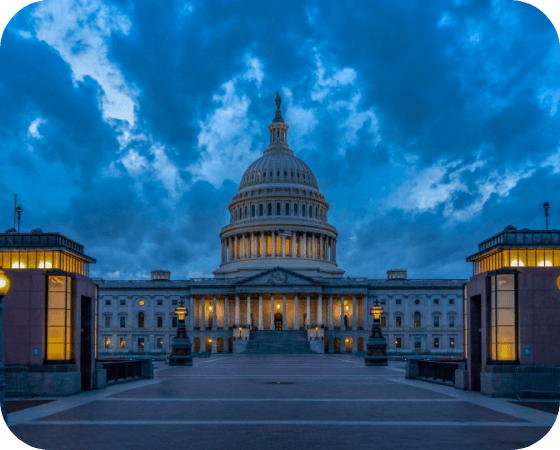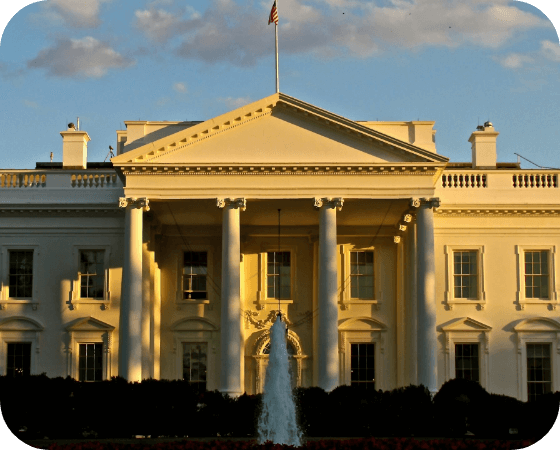Featured Blogs

The fireworks are just starting in Washington, DC even if Independence Day celebration is over. Democratic offices on the Hill are still working out the best way to handle President Biden’s debate performance, his subsequent interview with ABC, and questions about his fitness for office. Additionally, there is a new framework on how to implement federal regulations with the repeal of the Chevron Deference doctrine. So don’t put away those lawn chairs and blankets just yet. Welcome to the Week Ahead!
The Administration
We are eagerly waiting for the release of the CY 2025 proposed rules for the Physician Fee Schedule and the Outpatient Prospective Payment System. While we expected them last week, don’t worry the rules aren’t late – they dropped mid-July last year.
The Centers for Medicare and Medicaid Services (CMS) did drop the CY 2025 Home Health Proposed Rule and the CY 2025 End Stage Renal Disease (ESRD) Proposed Rule on June 26 and June 27, respectively. The proposed home health rule included an overall rate reduction of -1.7%. The proposed ESRD rule increases the base rate to $273.20.
Don’t forget – the FY 2025 final rules for inpatient hospitals, skilled nursing facilities, and inpatient rehabilitation facilities are coming out soon. They are under review at OMB right now.
But what about Chevron? The repeal of the Chevron Deference Doctrine by the Supreme Court on June 28 ends the long-held practice of giving deference to federal agencies when the laws they are tasked with implementing are not clear. This decision could complicate finalizing all sorts of rules, including health care provider payment rules. The Administration condemned the decision as one that will “block common-sense rules that keep us safe, protect our health and environment, safeguard our financial system, and support American consumers and workers.” Leading Democratic members of Congress, including Senate Majority Leader Schumer and House Judiciary Committee Ranking Member Nadler, have also criticized the decision.
The Senate
Nursing Home Staffing Rule Rebuke Possible
Speaking of rules, we are hearing rumors from within the Senate Democratic caucus that a Congressional Review Act vote may occur on the Biden Administration’s rule that would create a nursing home staffing mandate. This rule has come under fire from nursing homes and hospitals, and drawn bipartisan criticism on the Hill, especially in rural districts.
Although many Democratic senators are expected to vote against repealing the mandate, Democratic leadership may be looking to give a pass to vulnerable senators who face tough re-election campaigns in November. We expect the measure to pass in the Senate to pass this measure and to eventually make its way to President Biden’s desk where we expect he will veto the bill. We don’t see a scenario in which there is enough Democratic support to overturn the veto.
Health Care Hearings to Watch
- July 9: Senate Health, Education, Labor, and Pensions Subcommittee on Children and Families hearing on the impact of high costs (not explicitly health care, but health care costs are certainly a concern members like to talk about)
- July 11: Senate HELP Committee hearing on medical debt
- July 11: Senate Special Committee on Aging hearing on health care transparency
- July 11: Senate Appropriations Markup of Milcon-VA, Ag-FDA, and Legislative Branch Appropriations Acts and FY25 Subcommittee Allocations
- July 11: Senate Homeland Security and Governmental Affairs Committee hearing on Oversight of Taxpayer-Funded High-Risk Virus Research
The House
Biden’s House Woes
More Democratic Representatives are calling for President Biden to step aside and let someone else face former President Trump in the 2024 election as the House returns from recess. So far, that list includes Reps. Craig, Quigley, Kuster (Nem Democat Coalition Chair), Moulton, Doggett, and Grijalva. The New York Times is also reporting that Reps. Nadler, Adam Smith, Takano, and Morelle have urged House Minority Leader Jeffries to get President Biden to end his reelection bid. These House Democrats join the Democratic Governor of Massachusetts in calling for Biden to let someone else run. Additionally, Sen. Warner of Virginia is reportedly working on building support among Senate Democrats to urge Biden to get out of the race.
Labor-HHS and FDA Appropriations Bills Set to be Marked Up
The House Appropriations Committee is scheduled to markup the Labor, Health and Human Services (HHS), Education, and Related Agencies Appropriations Bill for FY 2025 on July 10. It is also scheduled to markup other appropriation legislation, including its version of the Agriculture, Rural Development, Food and Drug Administration (FDA) Appropriations Bill for FY 2025. We will be watching for details on these bills as we move closer to the markup date, and to see if the bills that emerge include any controversial provisions on hot button issues like abortion.
Ways and Means Goes West
Much like the prospectors who went west during the California gold rush, the House Ways and Means Committee will be heading west for a field hearing in Utah on July 12. But unlike those prospectors looking for gold and silver, the Committee is looking for a different type of treasure. That is how to support medical innovation.
In theory, this is an area that could be a gold mine for bipartisan action. However, it remains to be seen if the committee can strike it rich or if things will be held up by partisan disagreements over how to best get the gold. We expect Republican members to criticize government interference in private-sector innovation, while Democratic members will likely highlight the importance of investing in research to make such innovations possible and the need to ensure those innovations are affordable.
There You Have It
Can you believe it’s already July? As if that was not hard enough to believe, the Republican National Convention begins July 15! Before you know it, summer will end, and the final push to the election will be upon us. So, soak up the sun and the speeches while you can. Make it a great week!
On June 26, 2024, the House Ways and Means Health Subcommittee held a hearing on how to improve value–based care for both providers and beneficiaries within the Medicare program. Representatives questioned witnesses about what has worked and what has not worked.
On June 4, 2024, the House Energy and Commerce Oversight and Investigations Subcommittee held a hearing on how “covered entities” use savings from the 340B program and the impact of potential program reforms on “covered entities” and patients.

The first presidential debate for the 2024 electionis upon us, with President Biden and former President Trump set to take the stage in Atlanta on June 27. As the candidates and the country prepare, we at Chamber Hill Strategies are also watching for the release of two proposed Medicare rules, a possible Ways and Means markup, and more. So, let’s get into it, welcome to the Week Ahead!
The Administration
Summers in Washington bring blazing heat and crowds of tourists. Summer is also when we start seeingthe arrival of more Medicare payment proposed rules. So as the temperature climbs,we are hearing these 2 rules could be released as early as June 28:
- Proposed CY 2025 Physician Fee Schedule Rule: The PFS is how the Centers for Medicare and Medicaid Services (CMS) pays for physician services, incidental services, non-clinical laboratory diagnostic tests, and radiology services.
- Proposed CY 2025 Outpatient Prospective Payment System. The OPPS is how CMS generally pays for hospital outpatient department services.
We are eagerly anticipating the rules governing the Home Health Prospective Payment System and the End-Stage Renal Disease Prospective Payment System, but those are still under review at the Office of Management and Budget.
These proposed rules are vitally important to health care providers and the Medicare beneficiaries they serve. They also provide an opportunity for the Administration to advance health care priorities with a Republican-controlled House and a Senate that lacks a filibuster-proof majority for Democrats. For example, we could see the Administration try to advance payment policies in the PFS that require inclusion of data on social determinants of health. We might also see the Administration include provisions in the OPPS rule designed to encourage hospitals to adopt stronger cybersecurity protections. We will be watching closely for the release of these rules and diving into the details as soon as they come out.
The Senate
The Senate is out of session until after the 4th of July Holiday. We will provide updates when they return the week of July 8.
The House
Ways and Means Looks at Innovative Products
Rumor is that that the House Ways and Means Committee could meet this week to mark up legislation that would extend Medicare coverage for new and innovative technologies and products. While the markup has yet to be noticed, the Committee’s interest in advancing coverage for newly developed treatments and devices is not a secret in health policy circles. One possible candidate for consideration is H.R. 1691, the Ensuring Patients Access to Critical Breakthrough Products Act, which was introduced last year by Ways and Means member Rep. Brad Wenstrup (R-OH) and fellow committee members, Reps. Suzan DelBene (D-WA), Blake Moore (R-UT), and Rep. Terrie Sewell (D-AL); the bill would extend temporary Medicare coverage to devices approved under the Food and Drug Administration’s Breakthrough Devices Program. Also, rumored for possible consideration is H.R.5389, National Coverage Determination Transparency Act, which counts committee member Rep. Mike Kelly (R-KY) among its lead cosponsors. The legislation which was introduced by Energy and Commerce Health Subcommittee Chair Rep. Brett Guthrie (R-KY) was approved by the Energy and Commerce Committee in December.
These bills both become prime contenders for a House vote during a possible “health care week” in July.
Other Health Care Hearings on the Radar
- June 26: House Ways and Means Health Subcommittee hearing on Value-Based Care
- June 26: House Veterans Affairs’ Oversight Subcommittee hearing on the VA’s Healthcare Network
- June 27: House Education and the Workforce Health, Employment, Labor, and Pensions Subcommittee hearing on the Employee Benefits Security Administration
- June 27: House Appropriations Labor, Health and Human Services, Education Subcommittee Markup
There You Have It
Did you know that the first televised debate about a presidential election featured two women? That’s right,in 1956, former First Lady Eleanor Roosevelt, acting as a surrogate for Democratic candidate Adlai Stevenson, debated Sen. Margret Chase Smith, acting as a surrogate for Republican President Dwight Eisenhower. Do you know any other fun facts about presidential debate history? If so, let us know! Make it a great week!


